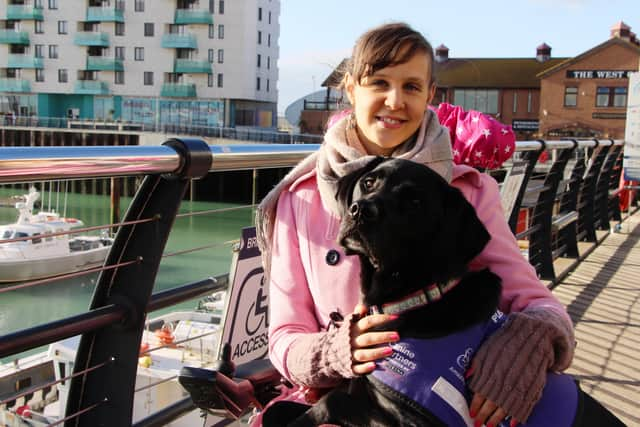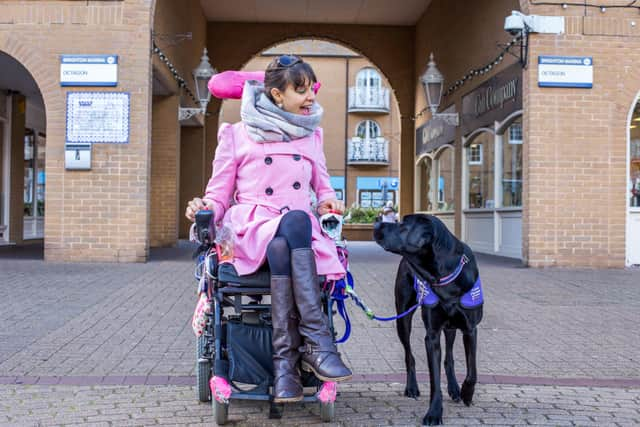‘Before I had my assistance dog Ethan I felt like a burden and a drain on society. Now I have my confidence back’
Ethan, Sally Whitney’s assistance dog is far more than just a physical aid for her.
“Before I had him I felt a burden and a drain on society,” says Sally, a disabled young researcher on a new project at the University of Sheffield.
Advertisement
Hide AdAdvertisement
Hide AdThe project, in collaboration with charity Canine Partners, set out to discover whether assistance dogs have a significant positive impact on the mental health of disabled young people.


Sally, who suffers from a variety of complex health needs, including the autoimmune condition Lupus, and Ehlers Danlos Syndrome, also has daily seizures. She says life has changed considerably since having Ethan.
“Because of my disabilities I am very reliant on other people to do things for me. Before I got Ethan I was always having to ask people to get things for me and to help me with simple tasks. I was allowed to spend an time on my own – I couldn’t help but feel like a burden and that I didn’t do anything other than take from society rather than contributing anything to it.”
Sally had been planning to go to medical school but when she was 17 suddenly fell ill.
Advertisement
Hide AdAdvertisement
Hide Ad“ I managed to get my place deferred and I did attend for a little bit but I ended up in intensive care.”


That was in 2013 and she hasn’t been able to work since then and now needs round the clock care.
“I got to point where I couldn’t see what skills I had or what use I was to anyone.”
But then she got Ethan.
“He is a Canine Partner trained assistance dog and the bond we have is just incredible,” says Sally. “He just seems to know when I need him to do something for me and I don’t need to even ask. His love is unconditional and due to this I started to build up my self confidence and to see myself as something other than a burden to society.”
Advertisement
Hide AdAdvertisement
Hide AdAs well as doing everyday tasks such as helping Sally get dressed, fetch her mobile pone and open and close doors, Ethan is trained to recognise when Sally is going to have a seizure and goes to get help. Their bond is unbreakable and he was even her Dog of Honour at her wedding to husband Ed.
When she saw an advert on FaceBook looking for people to take part in a disability research project called Living Life to the Fullest being run by the University of Sheffield she decided to contact them.
She’d also started to do some volunteer work for Canine Partners, talking to people about how Ethan has changed her life for the better. “This all helped my self worth grow even more as I started to feel useful and that people wanted to hear what I had to say,” says Sally.
The Living Life to the Fullest project led to the work with Canine Partners and looking at the impact of having an assistance dog.
Advertisement
Hide AdAdvertisement
Hide Ad“Canine Partners trains dogs to assist people with physical disabilities to do physical tasks, but I knew from own experience that the benefits were far greater to a young person with disabilities than purely physical,” says Sally, who is now a paid researcher for the university.
“We wanted to find out the extent to which this was the case for other young people with disabilities.”
Using surveys and interviews with disabled people aged between 18 and 35 who are partnered with an assistance dog, the researchers found 86 per cent felt more optimistic thanks to their dog.
Over 90 per cent of disabled young people surveyed reported feeling less lonely, 88 per cent felt less anxiety and 86 per cent felt less isolated. Assistance dogs were said to boost confidence for 90 per cent of participants, and help them to navigate social situations.
Advertisement
Hide AdAdvertisement
Hide AdThe dogs were also said to put non-disabled people more at ease in social situations, and help 67 per cent of the young people to embrace their disability. Nine out of 10 of those surveyed said their dog had boosted their confidence, with some saying they had helped them to achieve major goals such as getting a degree and living independently.
Over two- thirds of disabled young people said that, since getting their assistance dog, they relied less on support from human carers – with 81 per cent saying they had reduced the discomfort and guilt they feel when relying on human carers. More than half also felt that their assistance dog had helped them take better care of their physical health.
“Leading the project has been an honour and a joy as it is a topic that is incredibly important to me, “ says Sally who was able to lead the Sheffield research from her own home in Brighton using remote communications technology, something an increasing number of people are now doing during the coronavirus lockdown.
“This has given me the impetus to probe further into the experiences of other young people and the results have shown an even deeper level of impact than I had anticipated.
Advertisement
Hide AdAdvertisement
Hide Ad“It is clear that assistance dogs do so much more than physical tasks and have a transformational impact on how young people receive care and, in turn, on so many aspects of their lives.”
Dr Kirsty Liddiard, senior research fellow at the University of Sheffield, said: “Our research makes clear the transformative impact an assistance dog can have on a disabled young person’s life – increasing their independence, building their confidence and helping them to embrace who they are.
“In the future, we would like to see policymakers, local authorities and care professionals making all young people with physical impairments aware of the possibilities and benefits of canine care.”
Comment Guidelines
National World encourages reader discussion on our stories. User feedback, insights and back-and-forth exchanges add a rich layer of context to reporting. Please review our Community Guidelines before commenting.